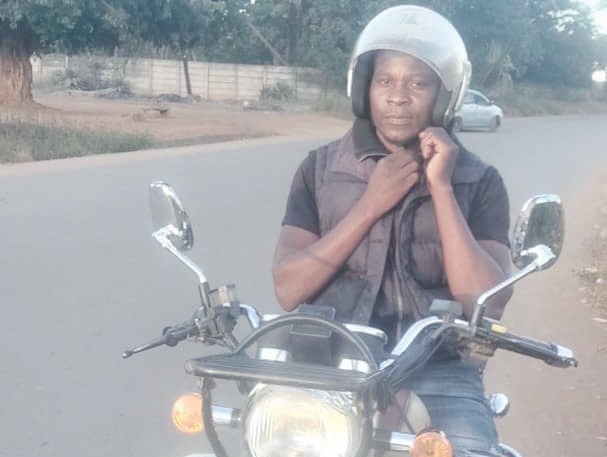Our Terms & Conditions | Our Privacy Policy
Riding out of poverty with Kabaza
Life of Innocent Precious Nzelera of Siliya Village, Traditional Authority (T/A) Mwambo in Zomba, took a remarkable turn in 2019 when he invested his earnings from some work with Malawi Electoral Commission (MEC) into a motorcycle taxi locally known as Kabaza.
What seemed like a small move at the time became the foundation of Precious’ personal development.
 Precious on a motorcycle
Precious on a motorcycle
In 2018, Precious had graduated with a diploma in Youth Development from
Lilongwe University of Agriculture and Natural Resources (Luanar), hoping to find a job within his career path.
It was never the case. He picked up a temporary job with MEC as a registration officer during the 2019 tripartite elections from whose savings he bought a second hand motorcycle at just K200 000.
“I was trying to survive after getting my diploma. I told myself that any business that makes at least K500 a day is worth pursuing. On my first day as a kabaza rider, I made K9 300,” he recalls.
 Precious during graduation
Precious during graduation
Operating in Lilongwe’s City’s Area 24 where he has lived for the past six years, Precious used his Kabaza earnings to enroll for a degree programme in Social Work and Youth Development at Luanar through Open and Distance Learning (ODL). This was 2021.
“I paid tuition, rented a room, and fed myself—all from that one motorcycle,” he said.
By 2022, his Kabaza hustle had grown. He bought a second motorcycle. A third one followed, making him both a rider and an employer of two.
From the three motorcycles, he currently earns K30 000 a day which amounts to K900 000 a month.
According to Precious, this is just on average as sometimes he can make more.
Now married, Precious has chosen to focus on this business from where he sees a lot of potential for growth.
“I am not applying for a job. I have hope this business will grow. I am thinking of adding more motorcycles. It really pays,” added the former Luanar student who earned his degree last year.
Before 2014, motorcycle taxis in Malawi were not common. But everything changed when Malawi’s first female president Joyce Banda in a campaign trail of the 2014 polls introduced the idea of affordable motorcycles as a strategy to combat youth unemployment.
Of course others looked at it as a way of winning votes. Whichever the case, that initiative to give out motorcycles to the youth seemed to have changed how Malawians perceive Kabaza.
Life in most parts of Malawi’s cities and district trading centres, previously, would grind to a halt as early as 9pm. Streets emptied, shops shuttered and silence ruled the night.
Today, the Kabaza business has turned city life into a 24/7 affair, giving thousands of young people like Precious a chance to drive themselves out of poverty.
Blandina Kamoyo, a business woman and one of Precious’ regular customers, says Kabaza offers unmatched convenience.
Said Kamoyo: “I prefer Kabaza because it’s faster, especially during traffic jams. It gets me to the market and back in no time. And I can always count on Precious—he’s reliable and respectful.”
But Kabaza has not only benefited operators but also customers, who have found this mode of transport convenient,
The Malawi Coalition for Kabaza Associations and Stakeholders (Macokasa) indicates that it has a membership of about 2.2 million.
In an interview Macokasa chairperson Moses Mwalabu said statistics speak for themselves how Kabaza has revolutionised the transport sector in Malawi.
“We are everywhere in this country. Kabaza provides employment. This is
a mode of transport that has really improved lives of many and as an association we are happy for that,” said Mwalabu.
[ad_1]
Images are for reference only.Images and contents gathered automatic from google or 3rd party sources.All rights on the images and contents are with their legal original owners.
[ad_2]



Comments are closed.